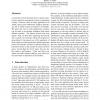Free Online Productivity Tools
i2Speak
i2Symbol
i2OCR
iTex2Img
iWeb2Print
iWeb2Shot
i2Type
iPdf2Split
iPdf2Merge
i2Bopomofo
i2Arabic
i2Style
i2Image
i2PDF
iLatex2Rtf
Sci2ools
IPTPS
2005
Springer
2005
Springer
Quickly Routing Searches Without Having to Move Content
A great deal of work has been done to improve peerto-peer routing by strategically moving or replicating content. However, there are many applications for which a peer-to-peer architecture might be appropriate, but in which content movement is not feasible. We argue that even in such applications, progress can be made in developing techniques that ensure efficient searches. We present several such techniques. First, we show that organizing the network into a square-root topology, where peer degrees are proportional to the square root of the popularity of their content, provides much better performance than power-law networks. Second, we present routing optimizations based on the amount of content stored at peers, and tracking the “best” peers, that can further improve performance. These and other techniques can make searches efficient, even when content movement or replication is not feasible.
Related Content
| Added | 27 Jun 2010 |
| Updated | 27 Jun 2010 |
| Type | Conference |
| Year | 2005 |
| Where | IPTPS |
| Authors | Brian F. Cooper |
Comments (0)

